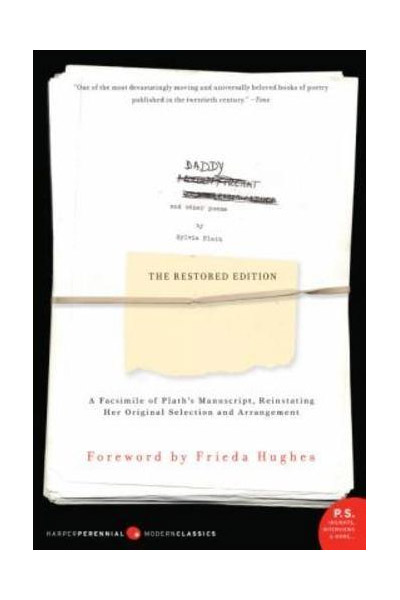
It is difficult to read Sylvia Plath, one of the finest poets of the 20th century, without the knowledge and half-knowledge of her life and death intruding and cementing meaning on to her work.
This, her second collection, published posthumously in 1965, contains some of her most fabulously versatile and energetic verse despite her preoccupation with death which is often as theatrical as it is agonising.
The volume begins as she wanted with Morning Song, a colourful, rich poem to her baby: Love set you going like a fat gold watch.
In it, she sees herself as cow-heavy and floral in my Victorian nightgown, contrasting beautifully with the child's mouth which opens clean as a cat's.
She need not mention milk.
The clear vowels of the baby's cries rise like balloons, re-emphasising the lightness and playful joy she could experience through motherhood.
Night Dances, about the pure leaps and spirals her son performed in bed before laying down, comfort her.
Surely they travel / The world forever, I shall not entirely / Sit emptied of beauties, the gift / Of your small breath, the drenched grass / Smell of your sleep, lilies, lilies.
The risky, running images and associations are breathtaking, still.
There is something redemptive in her love for her child which eases her anguish.
The blood blooms clean / In you, ruby.
/ The pain / you wake to is not yours .
You are the one / Solid the spaces lean on, envious.
Her infamous poems Lady Lazarus and Daddy are also here.
In both, the first person narrator is a persona, a fiction that overlaps with autobiography.
Plath once explained that Lady Lazarus is a woman who has the great and terrible gift of being reborn.
The only trouble is, she has to die first.
Deeply sardonic in tone, she has the levity of Dorothy Parker in moments.
Dying is an art, like everything else.
/ I do it exceptionally well.
But there is resurgence after melt-down: Out of the ash / I rise with my red hair / And I eat men like air.
Anger with her father, characterised as a Nazi, Herr Enemy extends in Daddy.
Daddy, I have had to kill you.
/ You died before I had time-- / Marble-heavy, a bag full of God.
It remains a staggering and disturbing poem in which she imagines herself the daughter of a Nazi and a Jew.
Plath would have preferred to end the collection with Wintering, a less contorted poem about storing honey from her beehive.
It ends hopefully: The bees are flying.
They taste the spring.
Often puzzling or plainly obtuse, Plath's all the better for that.
--Cherry Smyth --This text refers to an out of print or unavailable edition of this title.
| Baby | Love set you going like a fat gold watch |
|---|---|
| But there is resurgence after melt-down | Out of the ash |
| It ends hopefully | The bees are flying |
Harper Perennial este o amprentă a HarperCollins Publishers, una dintre cele mai mari edituri din lume.
Harper Perennial se concentrează pe publicarea de cărți de ficțiune și non-ficțiune contemporană în format broșat.
Amprenta este cunoscută pentru lista sa diversă și eclectică de titluri, care acoperă diverse genuri, cum ar fi ficțiune literară, memorii, eseuri, poezie și multe altele.
Harper Perennial se angajează să aducă cititorilor literatură captivantă și care provoacă gândirea, atât de la autori consacrați, cât și de la cei emergenti.
Amprenta reeditează adesea lucrări clasice și publică noi ediții de titluri îndrăgite, precum și introducerea cititorilor în voci proaspete și povestiri inovatoare.
Cu gama sa largă de titluri și angajamentul față de literatura de calitate, Harper Perennial s-a impus ca o sursă de încredere pentru cititorii care caută cărți captivante și stimulatoare intelectual.
Mulți autori apreciați au fost publicați sub amprenta Harper Perennial, contribuind la reputația sa pentru publicarea de lucrări influente și semnificative din punct de vedere cultural.